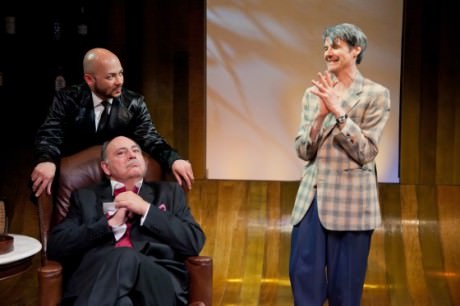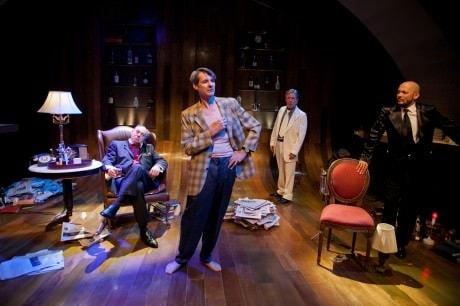True to author Harold Pinter’s many talented literary works and dark psychological themes, the opening night of No Man’s Land on May 2, 2013, in the WSC Avant Bard’s new space at Theater on the Run, provided all the ‘pomp and circumstance’ of a glorious war between men. One may recall that this music, penned by Sir Edward Elgar in 1901, is titled from Act III, Scene 3 of Shakespeare’s Othello:
“Farewell the neighing steed and the shrill trump,
The spirit-stirring drum, th’ear-piercing fife,
The royal banner, and all quality,
Pride, pomp, and circumstance of glorious war!”

Also, one may recall that the term ‘no man’s land’ concerns land that is unoccupied or under dispute between opposing parties, who, at the end of the day, leave it unoccupied due to their own fear or uncertainty of being attacked while attempting to obtain it.
Directed by veteran Tom Prewitt, Pinter’s No Man’s Land features a battle, figuratively speaking, between an aging poet who drunkenly banters back and forth with a mysterious stranger over what constitutes success, real or imagined adventures and accurate recall of long-ago romantic conquests.
WSC Avant Bard’s cast is phenomenal. Artistic Director Emeritus Christopher Henley plays Spooner – an alcoholic upper-class professional writer, and his predecessor, Brian Hemmingsen, portrays Hirst – a failed, down-at-the-heel poet, as they both star in this play of wit, deceit, and the war between memory and imagination. The all-male cast is rounded out by the stellar performances of Frank Britton as Foster – a purported writer’s assistant, and Bruce Rauscher as Briggs – a man servant, or apparent body guard. Hirst lives in grandeur with Foster and Briggs, who are both at his beck and call.
Scenic Designer Steven T. Royal (who also provides the class-appropriate costumes) sets the production in a large room, assumed to be in the city of Hampstead, an upper class neighborhood, in North West London, on a summer night. It’s England, circa 1974. The floor and walls are identical, a rich dark brown wood with exterior brick walls featuring a huge concrete arc which sports a giant “H” at its center. The room is in genteel disarray, as one might expect of a writer. There are books and newspapers on the floor, a leather chair, an upholstered chair, and, of course, bookshelves. However, these bookshelves house far more wine glasses, whiskey bottles, and other alcoholic beverages than books. Small table lamps illuminate the space, giving it an intimate, cozy feel. Joseph R. Walls and David Crandell’s excellent lighting and sound design add to the atmosphere and mood.
The first act involves themes of promiscuity, homosexuality, and sexual escapades. Hirst had picked up Spooner in a Hampstead pub and invited him home for a drink; yet when confronted with Spooner’s advances, he dances around the chair, avoiding him. The back and forth bantering between them continues throughout the scene. Every bit the groomed and proper butler/man servant, Briggs makes several cutting references to Foster as a “vagabond cock,” which by definition of ‘vagabond’ is a wanderer with no permanent place to live; thus coupling this term with ‘cock’ gives the impression that Briggs believes Foster frequently dallies in temporary sexual escapades, possibly male and female. Indeed, Britton skillfully portrays Foster’s character by prancing about the stage like a peacock. His speech is noticeably “the Queen’s English.”
During Act Two, allusions to other themes include the fallibility of memory, the unknowability of women, and the premise that all human contact is war – a battle that while fought can never truly be won by either side. I am not convinced of this because found both actors focused, intense, and believable. So when Hirst inquires about Spooner’s wife, saying “How’s Emily? What a woman!” And, “You know I proposed to her? And seduced her eventually,” the verbal battle begins!
Even given these stark themes, the play is not without humor, however, and plenty of it. Frequent back-and-forth robust comedy between Hirst and Spooner, and Briggs and Foster elicit such dialogue as:
Hirst questions Spooner, saying, “Where is the moral ardour that sustained you once?” Spooner responds, “Gone down the hatch.”– Hirst empties his glass, wistfully and comically combining the clichés “Gone with the Wind” and “Down the hatch,” as if referencing his own life.

I came to see the play a “Pinter Virgin,” and while I cannot claim to have fully grasped it all, No Man’s Land is a complex, multi-layered, fascinating play that may not be fully appreciated in one viewing – yet it works on so many levels. It is a subtle, dark drama with comedic overtones throughout as if to advise, ‘Appreciate life but also laugh at life.’ As the genesis of the play’s first line (“As it is?”) is evoked — the equivalent of today’s modern phrase “It is what it is” comes to mind. Don’t miss it!
Running Time: Two hours, with one 10-minute intermission.
No Man’s Land plays through May 25. 2013 at WSC Avant Bard at Theatre on the Run – 3700 South Four Mile Run, in Arlington, VA. For tickets, call the box office at (703) 418-4808, or purchase them online.





